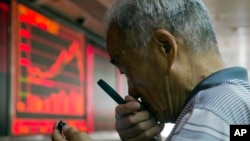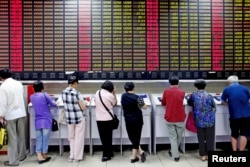China’s two stock markets closed higher Thursday, but only after extraordinary measures halted trading on half of the listed stocks and state-backed investors poured billions into the biggest companies.
The actions stopped the market’s 25 percent slide since mid-June, but analysts warned the massive intervention by authorities damaged foreign investor confidence in China’s markets.
"They can control interest rates but I don't believe they can control the value of equity prices. And I don't think that, in the end, attempts to do so will prove successful," independent economist George Magnus said.
About 1,500 issues, half of the total listed companies on the Shanghai and Shenzhen exchanges, are now on the sidelines, either because their shares fell more than 10 percent or because companies requested a halt.
That freeze, combined with directives from Beijing, allowed the Shanghai Composite Index to gain 5.76 percent, its biggest one-day rise since 2009.
Shenzhen’s Component Index climbed 4.25 percent.
Hong Kong also saw a partial recovery after a 5.8 percent plunge the previous day. The Hang Seng Index on Thursday rose 3.73 percent.
Risks involved
Beijing ordered investors with stakes of at least 5 percent in listed companies to not sell any of their shares for at least six months. Banking regulators, meanwhile, are allowing lenders to roll over loans backed by stocks.
Chinese authorities have also lent $42 billion to brokerage firms to purchase blue chips while pledging to acquire additional small- and medium-sized listed companies’ shares.
This is all adds up to an "astounding array of tools which they have deployed to try to prop up a stock market bubble -- a euphoria -- which is of their own making," Magnus, a former chief economist of Switzerland’s biggest bank UBS, told VOA.
The China stock market plunge could undermine confidence in top leaders in Beijing, who are already grappling with a slowing economy.
"If this goes on for too long, it will eventually have an impact on the economy," said Song Zhongzhi, assistant professor of finance at the Cheung Kong Graduate School of Business in Beijing.
"Without calming the market down quickly, pessimistic sentiments will spill over to the banking sector and then eventually to the real economy," said Oliver Riu, professor of finance and accounting at the China Europe International Business School.
'Manipulators' blamed
Authorities have now vowed to punish market manipulators. The state-run media has blamed the selloff, which erased nearly $4 trillion in market value, on short selling, rumor-mongering and foreign meddling.
China’s domestic security agency and securities regulators will investigate “malicious” short selling, the official Xinhua News Agency reported Thursday.
Those determined to have engaged in illegal market activities would face a “punch back” from a “big fist,” according to Xinhua.
Outside analysts said the causes of the sinking markets are relatively straightforward, because the dramatic rise of stock prices over the past year had far outstripped corporate profits.
As investors continued to buy into the rising market, it developed into a bubble and the recent drop in prices is a necessary correction.
But many predict Beijing will continue to try to prop up stock prices, in order to prevent additional turmoil.
“In a speculative market, what matters is how you manage expectations. The authorities have to do more. They will have to create a floor, which means continuous buying for some time,” said Michael Petis, professor of finance at Peking University's Guanghua School of Management.
Contagion risks
Despite the government’s extensive intervention, analysts say they still do not expect the sinking stocks to spill-over to the broader economy.
That's because stocks represent less than 15 percent of household assets while equities account for less than 5 percent of total corporate financing, said Julia Wang, an economist at The Hong Kong and Shanghai Banking Corp. (HSBC).
Wang said the government remains most concerned with stabilizing the markets.
“It’s not really the impact it will have on the real economy, but more about the potential risks to limit,” she said.
Reporter Joyce Huang also contributed to this story.








